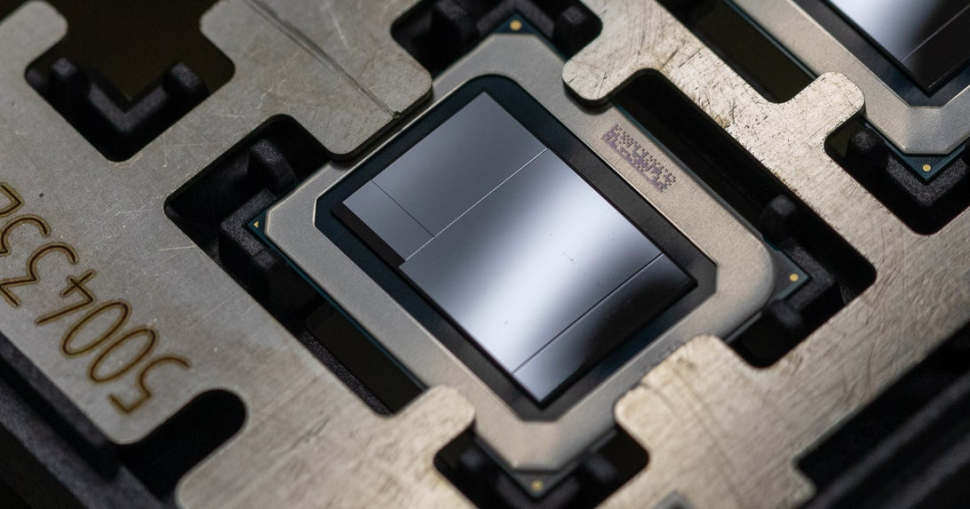Intel maintains next-gen Meteor Lake CPUs still 'on track' for this year despite $700M losses
Intel's revenues down by over 30%, but next-gen CPUs due later this year.

Intel has posted some pretty grim financial numbers, with revenues for its most recent quarter down fully 32% year-on-year leading to a loss of nearly $700 million. And yet, Chipzilla remains bullish about it roadmap and the imminent arrival of its new chiplet-based Meteor Lake chips.
Without getting into the weeds re the numbers, Intel's sales were down for both PC and server chips. While that nigh-on $700 million loss in Q4 2022 sounds—and is—bad, it hardly spells doom for the company. After all, Intel made nearly $5 billion in profits in the same quarter in 2021, so a single quarter of losses isn't going to bankrupt the firm.
But it does reflect Intel's broader struggles with getting its Intel 7 technology (the node formerly known as 10nm) up to speed, and to a lesser extent other disappointments, including its Arc graphics products arriving late and underperforming.
With the broader global economic downturn, however, some tough numbers from Intel are hardly a surprise. Intel is far from alone in the tech sector in suffering a downturn in recent quarters.
Moreover, Intel is predicting another bad quarter for Q1 2023. But what matters, arguably, is how Intel executes on its upcoming roadmap and whether it can continue to deliver product when it promises to. Most immediately, that means its 14th Gen Meteor Lake CPUs.
On that note, there is at least better news. Along with the financial numbers, Intel also released some roadmap guidance. Intel maintains that its new Intel 4 (or 7nm) node is "manufacturing ready" and its plans to ramp up production of those new Meteor Lake chips based on Intel 4 in the second half of this year remain on track.
Meteor Lake is set to be Intel's first "chiplet" design, with the CPU cores, graphics and I/O all on separate dies. Indeed, the graphics die is slated to be manufactured for Intel by Taiwanese foundry TSMC, which also makes its Arc GPUs right now.
The biggest gaming news, reviews and hardware deals
Keep up to date with the most important stories and the best deals, as picked by the PC Gamer team.

Best CPU for gaming: The top chips from Intel and AMD
Best gaming motherboard: The right boards
Best graphics card: Your perfect pixel-pusher awaits
Best SSD for gaming: Get into the game ahead of the rest
Exactly what the second half of this year in terms of ramping up production means in for Meteor Lake CPUs that we can all actually buy is still unclear. As long ago as summer 2021 Intel was talking about having already taped out Meteor Lake CPUs and was talking up plans of manufacturing on Intel 3 rather than Intel 4 by the second half of this year. Though Intel 3 is a refinement of Intel 4, not a fully new node.
Anyway, we'll believe those Meteor Lake CPUs when we see them. Intel may be manufacturing Meteor Lake CPUs this year. But that doesn't guarantee we'll be able to buy them in 2023.
Speaking of taping out chips, Intel also said that it has taped out test chips on the 20A and 18A nodes and that both nodes remain on track. Given those are "test" chips rather than actual CPU designs, that puts the 20A and 18A nodes further out today than Intel 4 was in summer 2021.
That said, Intel also claims that it has taped out test chips for a "major potential foundry customer" on its upcoming 20A and 18A nodes. So, as far as Intel is concerned, both its own roadmap and plans to begin cranking out chips for other companies—maybe even rivals like AMD and Nvidia—are go, go, go.
But drawing firm conclusions from any of this tricky. Intel is certainly suffering at the moment. But so is much of the tech industry. As ever, Intel's fortunes will hinge on its ability to deliver on those promises—Meteor Lake later this year, and then a timely follow up with 20A and 18A production technology.
If Intel does all that, the future is bright. But after such a long period of missing targets, going back nearly 10 years now, the company has it all to prove.

Jeremy has been writing about technology and PCs since the 90nm Netburst era (Google it!) and enjoys nothing more than a serious dissertation on the finer points of monitor input lag and overshoot followed by a forensic examination of advanced lithography. Or maybe he just likes machines that go “ping!” He also has a thing for tennis and cars.

